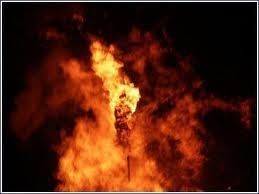Witch Hunts In Papua New Guinea On The Rise, Killings Connected To Economic Growth And Jealousy

Growing violence in Papa New Guinea has been blamed on witch hunts. The small island in Oceania has been the scene of kidnappings, public killings and decapitations – all victims have been accused of witchcraft, AP reports.
In April, schoolteacher Helen Rumbali was kidnapped along with her sister and two nieces. They were tortured for three days before being beheaded in front of their local community, the Telegraph reports. Days earlier, six women were reportedly tortured with hot irons, and one was buried alive in an Easter “sacrifice.” In February, a young mother accused of sorcery was burned at the stake in front of a crowd. Last July, 29 members of an alleged witch-hunting gang were arrested after they murdered and cannibalized seven people they accused of being "witch doctors."
“There are more than 800 different cultures in PNG, and belief in sorcery is pervasive across most of them,” Richard Eves, an Australian anthropologist, told Time Magazine. “Legislation and good policy don’t necessarily mean an end to the problem because the ratio of police to population is quite low. When you’ve got an armed mob screaming for blood, there’s nothing much a few policemen can do. And the fact is that police in PNG are just as likely to believe the accused are guilty as charged.”
For 42 years, the county upheld a Sorcery Act that allowed attackers to use sorcery as an excuse for perpetrating violence. After the recent string of tortures, the act was repealed, The New York Times reports.
Some believe the violent witch hunts are linked to economic jealousy – where the rich are pitted against the poor.
"Jealousy is causing a lot of hatred," Helen Hakena, chairwoman of the North Bougainville Human Rights Committee, which is based in the area Rumbali was killed, told AP. "People who are so jealous of those who are doing well in life, they resort to what our people believe in, sorcery, to kill them, to stop them continuing their own development."
Although the reason behind the extreme violence remains unclear, economic growth may be a contributing factor. Mineral resources and natural gas have been found in Papa New Guinea, which has fueled economic growth by almost 7 percent annually from 2007 to 2010. But the country suffers from high levels of inequality – one of the highest in the Asia-Pacific region. Neighboring Vanuatu and the Solomon Islands also believe in sorcery, yet they have not experienced the same levels of extreme violence.
Grass-roots initiatives have been established to curtail the violence. In Simbu province, where most of the witch hunts take place, doctors at Kundiawa Hospital are helping families understand the medical reasons behind their family members’ deaths to ward off revenge killings, Time Magazine reports. Clergymen are training volunteers to find ways to stop sorcery accusations at funerals and to send text messages when they think a witch hunt is imminent.
© Copyright IBTimes 2025. All rights reserved.






















